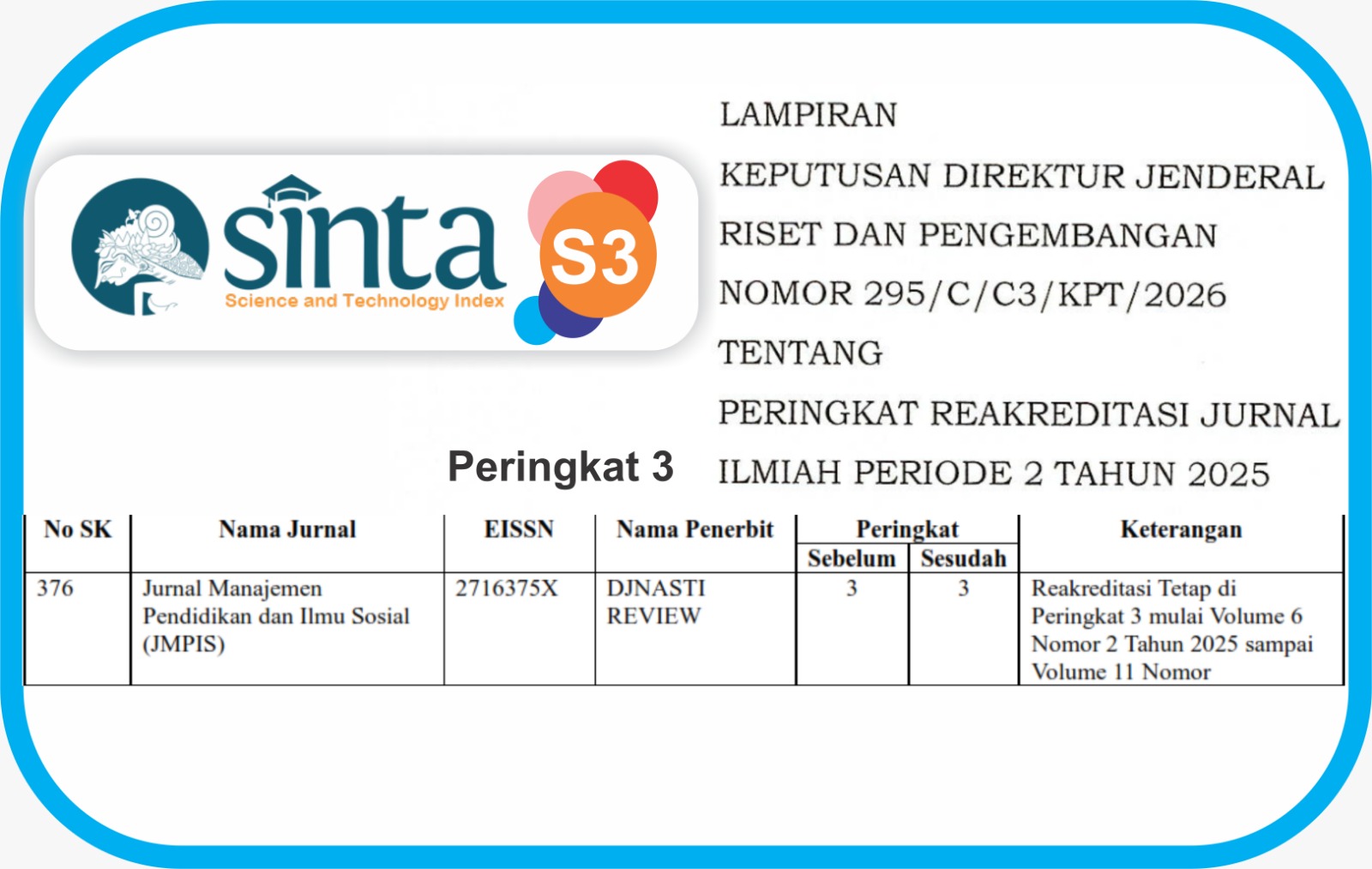Change Engagement sebagai Mekanisme Mediasi Antara Dukungan Organisasi dan Psikologis Terhadap Perilaku Proaktif di Sektor Publik
DOI:
https://doi.org/10.38035/jmpis.v6i4.5101Keywords:
Sumber Daya Organisasi, Sumber Daya Pekerjaan, Manajemen Perubahan, Perubahan Organisasi Sektor PublikAbstract
Restrukturisasi organisasi yang dipicu oleh perubahan kepemimpinan berdampak besar terhadap struktur, alur kerja, dan budaya dalam institusi publik. Penelitian ini bertujuan untuk menganalisis pengaruh sumber daya organisasi dan kondisi psikologis yang berkaitan dengan perubahan yaitu kebermaknaan perubahan, rasa aman secara psikologis, dan efikasi diri terhadap perilaku kerja proaktif, dengan change engagement sebagai variabel mediasi. Pendekatan yang digunakan bersifat kuantitatif dengan desain potong lintang dan penjelasan kausal. Data diperoleh dari 400 responden valid melalui survei daring. Teknik analisis dilakukan dengan pendekatan Partial Least Squares-SEM menggunakan perangkat lunak SmartPLS. Alat ukur yang digunakan mengacu pada skala yang telah divalidasi oleh Albrecht et al. (2022; 2023). Hasil penelitian menunjukkan bahwa sumber daya organisasi berpengaruh positif terhadap sumber daya pekerjaan, yang pada gilirannya meningkatkan keterlibatan dalam perubahan. Rasa aman secara psikologis dan efikasi diri memiliki pengaruh signifikan terhadap engagement, sedangkan kebermaknaan perubahan menunjukkan pengaruh yang terbatas. Change engagement terbukti memediasi secara kuat hubungan antara faktor organisasi dan psikologis dengan perilaku kerja proaktif. Temuan ini mendukung model change engagement dan menekankan pentingnya dukungan struktural dan psikologis dalam proses perubahan di sektor publik.
References
Albrecht, S. L., Connaughton, S., Foster, K., Furlong, S., & Yeow, C. J. L. (2020). Change engagement, change resources, and change demands: A model for positive employee orientations to organizational change. Frontiers in Psychology, 11(1). https://doi.org/10.3389/fpsyg.2020.531944
Albrecht, S. L., Connaughton, S., & Leiter, M. P. (2022). The influence of change-related organizational and job resources on employee change engagement. Frontiers in Psychology, 13(1). Frontiersin. https://doi.org/10.3389/fpsyg.2022.910206
Albrecht, S. L., Furlong, S., & Leiter, M. P. (2023). The psychological conditions for employee engagement in organizational change: Test of a change engagement model. Frontiers in Psychology, 14(14). https://doi.org/10.3389/fpsyg.2023.1071924
Bakker, A. B., & Demerouti, E. (2014). Job demands-resources theory. Wellbeing, 3, 1–28. https://doi.org/10.1002/9781118539415.wbwell019
Bakker, A. B., & Schaufeli, W. B. (2008). Positive organizational behavior: Engaged employees in flourishing organizations. Journal of Organizational Behavior, 29(2), 147–154. https://doi.org/10.1002/job.515
Bakker, A. B., & Demerouti, E. (2007). The job demands?resources model: State of the art. Journal of Managerial Psychology, 22(3), 309–328. https://doi.org/10.1108/02683940710733115
Bandura, A. (1977). Self-efficacy: Toward a unifying theory of behavioral change. Psychological Review, 84(2), 191–215. https://doi.org/10.1037/0033-295X.84.2.191
Bayraktar, S., & Jiménez, A. (2020). Self-efficacy as a resource: A moderated mediation model of transformational leadership, extent of change and reactions to change. Journal of Organizational Change Management, 33(2), 301–317. https://doi.org/10.1108/jocm-12-2018-0368
Cazan, A.-M. (2023). Psychological safety at workplace during changing times. trends and research implications. Psihologia Resurselor Umane, 21(2). https://doi.org/10.24837/pru.v21i2.550
Dagher, G. K., Chapa, O., & Junaid, N. (2015). The historical evolution of employee engagement and self-efficacy constructs. Journal of Management History, 21(2), 232–256. https://doi.org/10.1108/jmh-05-2014-0116
Demerouti, E., & Bakker, A. B. (2022). Job demands-resources theory in times of crises: New propositions. Organizational Psychology Review, 13(3), 1–28. https://doi.org/10.1177/20413866221135022
Faisaluddin Faisaluddin, Efi Fitriana, Yus Nugraha, & Hinduan, Z. R. (2024). Does meaningful work affect affective commitment to change? Work engagement contribution. SA Journal of Industrial Psychology, 50. https://doi.org/10.4102/sajip.v50i0.2143
Frazier, M. L., Fainshmidt, S., Klinger, R. L., Pezeshkan, A., & Vracheva, V. (2017). Psychological Safety: A Meta-Analytic Review and Extension. Personnel Psychology, 70(1), 113–165. https://doi.org/10.1111/peps.12183
Ferede, W. L., Endawoke, Y., & Tessema, G. (2024). Change management through strategic leadership: The mediating effect of knowledge management in public organizations, ethiopia. Future Business Journal, 10(1). https://doi.org/10.1186/s43093-024-00363-z
Hakanen, J. J., Perhoniemi, R., & Toppinen-Tanner, S. (2008). Positive gain spirals at work: From job resources to work engagement, personal initiative and work-unit innovativeness. Journal of Vocational Behavior, 73(1), 78–91. https://doi.org/10.1016/j.jvb.2008.01.003
Hakanen, J. J., Bakker, A. B., & Turunen, J. (2021). The relative importance of various job resources for work engagement: A concurrent and follow-up dominance analysis. BRQ Business Research Quarterly, 27(3), 234094442110124. https://doi.org/10.1177/23409444211012419
Haqq, Z. N., Haerudin, & Suwardi. (2023). Enhancing behavioral support for change: The role of employee participation and change self-efficacy as predictors. Advances in Economics, Business and Management Research, 80–97. https://doi.org/10.2991/978-94-6463-076-3_6
Jackson, J. W. (2002). Enhancing self-efficacy and learning performance. The Journal of Experimental Education, 70(3), 243–254. https://doi.org/10.1080/00220970209599508
Kahn, W. A. (1990). Psychological conditions of personal engagement and disengagement at work. Academy of Management Journal, 33(4), 692–724. https://doi.org/10.2307/256287
Kirk-Brown, A., & Van Dijk, P. (2015). An examination of the role of psychological safety in the relationship between job resources, affective commitment and turnover intentions of australian employees with chronic illness. The International Journal of Human Resource Management, 27(14), 1626–1641. https://doi.org/10.1080/09585192.2015.1053964
Parker, S. K., Bindl, U. K., & Strauss, K. (2010). Making things happen: A model of proactive motivation. Journal of Management, 36(4), 827–856. https://doi.org/10.1177/0149206310363732
McDonald, T., & Siegall, M. (1996). Enhancing worker self?efficacy: An approach for reducing negative reactions to technological change. Journal of Managerial Psychology, 11(2), 41–44. https://doi.org/10.1108/02683949610110550
Potipiroon, W., & Wongpreedee, A. (2020). Ethical climate and whistleblowing intentions: Testing the mediating roles of public service motivation and psychological safety among local government employees. Public Personnel Management, 50(3), 009102602094454. https://doi.org/10.1177/0091026020944547
Power, N., Philpot, R., Levine, M., & Alcock, J. (2025). Bridging the principle?implementation gap: Evaluating organizational change to achieve interoperability between the UK 174 emergency services. Journal of Occupational and Organizational Psychology, 98(1). https://doi.org/10.1111/joop.70010
Rafferty, A. E., & Restubog, S. L. D. (2016). Why Do Employees’ Perceptions of Their Organization’s Change History Matter? the Role of Change Appraisals. Human Resource Management, 56(3), 533–550. https://doi.org/10.1002/hrm.21782
Satwika, P. A., Suhariadi, F., & Samian. (2025). Exploring proactive work behavior: A scoping review of research trends and theories. Cogent Business & Management, 12(1). https://doi.org/10.1080/23311975.2025.2465904
Schaufeli, W. B., & Taris, T. W. (2013). A critical review of the job demands-resources model: Implications for improving work and health. Bridging Occupational, Organizational and Public Health, 43–68. https://doi.org/10.1007/978-94-007-5640-3_4
Verlinden, S., Bach, T., Wynen, J., Bjorn Kleizen, & Koen Verhoest. (2023). Does organizational change trigger civil servant proactivity? The impact of past changes experienced. Public Management Review, 1–20. https://doi.org/10.1080/14719037.2023.2284225
Xanthopoulou, D., Bakker, A. B., Demerouti, E., & Schaufeli, W. B. (2009). Reciprocal relationships between job resources, personal resources, and work engagement. Journal of Vocational Behavior, 74(3), 235–244. https://doi.org/10.1016/j.jvb.2008.11.003
Downloads
Published
How to Cite
Issue
Section
License
Copyright (c) 2025 Annisa Azka Nabilah, Elok Savitri Pusparini

This work is licensed under a Creative Commons Attribution 4.0 International License.
Hak cipta :
Penulis yang mempublikasikan manuskripnya di jurnal ini menyetujui ketentuan berikut:
- Hak cipta pada setiap artikel adalah milik penulis.
- Penulis mengakui bahwa Jurnal Manajemen Pendidikan dan Ilmu Sosial (JMPIS) berhak menjadi yang pertama menerbitkan dengan lisensi Creative Commons Attribution 4.0 International (Attribution 4.0 International CC BY 4.0) .
- Penulis dapat mengirimkan artikel secara terpisah, mengatur distribusi non-eksklusif manuskrip yang telah diterbitkan dalam jurnal ini ke versi lain (misalnya, dikirim ke repositori institusi penulis, publikasi ke dalam buku, dll.), dengan mengakui bahwa manuskrip telah diterbitkan pertama kali di Jurnal Manajemen Pendidikan dan Ilmu Sosial (JMPIS).











































































